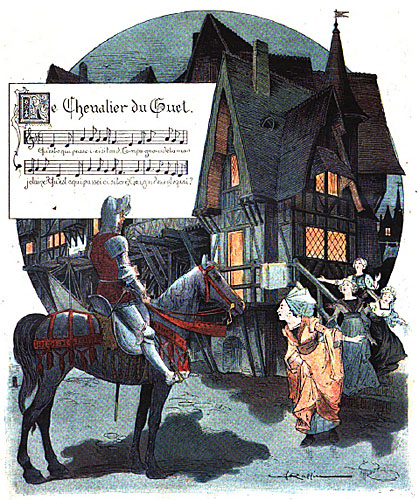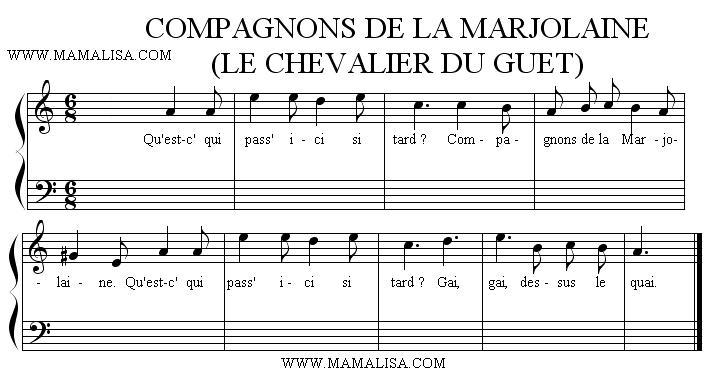Compagnons de la Marjolaine
This song dates back to around 1650. It takes place in Paris.

Compagnons de la Marjolaine
Company of the Marjoram
Chanson enfantine
Children's Song
(French)
(English)
Qu'est-ce qui passe ici si tard ?
Compagnons de la Marjolaine,
Qu'est-ce qui passe ici si tard ?
Gai, gai, dessus le quai.
C'est le chevalier du guet,
Compagnons de la Marjolaine,
C'est le chevalier du guet,
Gai, gai, dessus le quai.
Que demande le chevalier ?
Compagnons de la Marjolaine,
Que demande le chevalier ?
Gai, gai, dessus le quai.
Une fille à marier,
Compagnons de la Marjolaine,
Une fille à marier,
Gai, gai, dessus le quai.
N'y a pas d' fille à marier,
Compagnons de la Marjolaine,
N'y a pas d' fille à marier,
Gai, gai, dessus le quai.
On m'a dit qu' vous en aviez,
Compagnons de la Marjolaine,
On m'a dit qu' vous en aviez,
Gai, gai, dessus le quai.
Ceux qui l'ont dit s' sont trompés,
Compagnons de la Marjolaine,
Ceux qui l'ont dit s' sont trompés,
Gai, gai, dessus le quai.
Je veux que vous m'en donniez,
Compagnons de la Marjolaine,
Je veux que vous m'en donniez,
Gai, gai, dessus le quai.
Sur les onze heur's repassez
Compagnons de la Marjolaine,
Sur les onze heur's repassez
Gai, gai, dessus le quai.
Les onze heur's sont bien passées,
Compagnons de la Marjolaine,
Les onze heur's sont bien passées,
Gai, gai, dessus le quai.
Sur les minuit revenez,
Compagnons de la Marjolaine,
Sur les minuit revenez,
Gai, gai, dessus le quai.
Les minuit sont bien sonnés,
Compagnons de la Marjolaine,
Les minuit sont bien sonnés,
Gai, gai, dessus le quai.
Mais nos filles sont couchées,
Compagnons de la Marjolaine,
Mais nos filles sont couchées,
Gai, gai, dessus le quai.
En est-il un' d'éveillée ?
Compagnons de la Marjolaine,
En est-il un' d'éveillée ?
Gai, gai, dessus le quai.
Qu'est-ce que vous lui donnerez ?
Compagnons de la Marjolaine,
Qu'est-ce que vous lui donnerez ?
Gai, gai, dessus le quai.
De l'or, des bijoux assez,
Compagnons de la Marjolaine,
De l'or, des bijoux assez,
Gai, gai, dessus le quai.
Ell' n'est pas intéressée,
Compagnons de la Marjolaine,
Ell' n'est pas intéressée,
Gai, gai, dessus le quai.
Mon cœur je lui donnerai,
Compagnons de la Marjolaine,
Mon cœur je lui donnerai,
Gai, gai, dessus le quai.
Dans ce cas-là choisissez,
Compagnons de la Marjolaine,
Dans ce cas-là choisissez,
Gai, gai, dessus le quai.
"Who is passing by so late?
Company of the Marjoram
Who is passing by so late?
Hey! Hey! Over the quay!"
"It's the Knight Captain of the Watch,
Company of the Marjoram
It's the Knight Captain of the Watch,
Hey! Hey! Over the quay!"
"What is the Knight asking for?
Company of the Marjoram
What is the Knight asking for?
Hey! Hey! Over the quay!"
"A girl to marry,
Company of the Marjoram
A girl to marry,
Hey! Hey! Over the quay!"
"There aren't any girls here to marry,
Company of the Marjoram,
There aren't any girls here to marry,
Hey! Hey! Over the quay!"
They told me that you had some,
Company of the Marjoram,
They told me that you had some,
Hey! Hey! Over the quay!"
"Those who said so, they were wrong,
Company of the Marjoram,
Those who said so, they were wrong,
Hey! Hey! Over the quay!"
"I want you to find me some,
Company of the Marjoram,
I want you to find me some,
Hey! Hey! Over the quay!"
"Pass by again at eleven o'clock,
Company of the Marjoram,
Pass by again at eleven o'clock,
Hey! Hey! Over the quay!"
"Eleven o'clock has well passed,
Company of the Marjoram,
Eleven o'clock has well passed,
Hey! Hey! Over the quay!"
"Come back at midnight
Company of the Marjoram,
Come back at midnight
Hey! Hey! Over the quay!"
"Midnight has already struck,
Company of the Marjoram,
Midnight has already struck,
Hey! Hey! Over the quay!"
But our girls are all asleep,
Company of the Marjoram,
But our girls are all asleep,
Hey! Hey! Over the quay!"
"Is there one who is awake?
Company of the Marjoram,
Is there one who is awake?
Hey! Hey! Over the quay!"
"What will you give to her?
Company of the Marjoram,
What will you give to her?
Hey! Hey! Over the quay!"
"Plenty of gold and jewels,
Company of the Marjoram,
A lot of gold and jewels,
Hey! Hey! Over the quay!"
"She is not interested,
Company of the Marjoram,
She is not interested,
Hey! Hey! Over the quay!"
"I will give her my heart,
Company of the Marjoram,
I will give her my heart,
Hey! Hey! Over the quay!"
"In that case, make your choice,
Company of the Marjoram,
In that case, make your choice,
Hey! Hey! Over the quay!"
Notes
Note about the 1st Line:
The first line "Qu'est-ce qui passe ici si tard ? " translates literally to "What is passing by so late?" Another version of the 1st line is: "Qu'est-ce qui s' passe ici si tard" (What is happening here so late?) as you can hear in our mp3. Yet another version is "Qui est-ce qui passe ici si tard" (Who is passing by so late?).
Note about the meaning of the term "Compagnons de la Marjolaine":
Monique wrote: "Looking for information on the phrase, 'compagnons de la marjolaine', I came across a couple of websites. One explained that marjoram used to be used in love songs just like the rose or the lily of the valley. The other site explained how young men going out partying would put some sprigs of marjoram sticking out of the top of their boots. Hence forming an informal 'Fellowship of the Marjoram'. Both sites said that these men were 'charmers'.
The book, 'Trésors des plus belles mélodies de tous les temps et de tous les pays' (Delfolie, Editions Edsco, Chambéry, 1947) states that in the 15th century people wouldn't say 'to serenade someone'. Instead they would say, 'to wake up the pots of marjoram'.
The Brotherhood of the Marjoram (Confrérie de la Marjolaine) was the guild of perfumers. It was a very powerful guild because the king's court, and certain people in the city -good society I suppose- made very intense use of perfumes.
According to Du Mersan (Chants et chansons populaires de France, t. 2), the phrase 'compagnons de la marjolaine' was 'the meeting of young men and girls who go to dance in the meadow where the marjoram blooms'.
To sum it up, it seems that they were jolly good fellows!"
Note about the translation of the phrase "Compagnons de la Marjolaine":
"Compagnons de la Marjolaine" translates literally to "Companions of the Marjoram". Monique and I went back and forth for a good week discussing what would be the best way to translate it into English to make it understandable to today's audience. The meaning is close to "Fellowship of the Marjoram" or "Fellows of the Marjoram". "Company of the Marjoram" has a similar meaning to "Fellowship of the Marjoram", but it keeps the sound of the French "Compagnons de la Marjolaine" that's such an important part of the song. That's why we finally chose to translate it this way.
-Mama Lisa, January 2011
Note about the Translation of the term "Chevalier du guet":
A "Chevalier du guet" was a knight, and a nobleman, who was part of the city Watch. It's important to note that he was also the Captain of the Watch.
We had a hard time determining a translation of it into English that would get the meaning across.
Here's what Monique wrote about the meaning, "About 'Le chevalier du guet'... The historical fact is that he wasn't an ordinary Captain of the Watch. He was the Captain of the Paris watch and a nobleman -to use 'watchman' would make him an ordinary watchman which he wasn't. This guy was very important, he could go and find the king without being announced at any time...
I think that your suggestion "Knight Captain of the Watch" sounds good because you keep both meaning of knight and police officer included in 'le chevalier du guet'."

Edit' sings a different version of this song in the mp3.
Many thanks to Edit' Dupont for contributing and singing this song for Mama Lisa's World.
Thanks and Acknowledgements
Translated by Monique Palomares and Lisa Yannucci.
Image: "Le petit français illustré: journal des écoliers et des écolières", Volume 15, Issue 2 (1903).
Merci beaucoup!

























